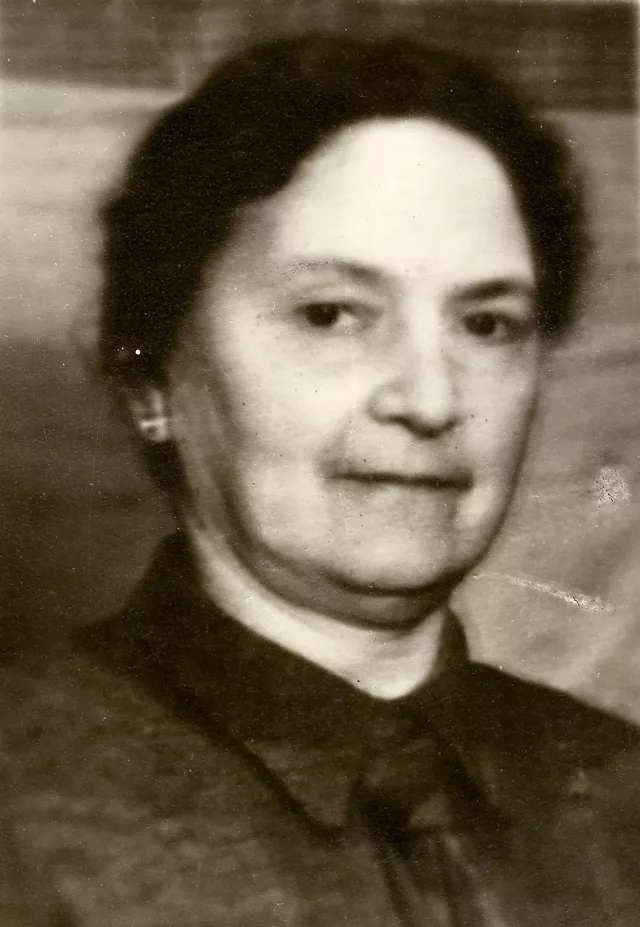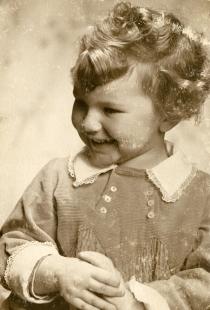This is a picture of my mother Ester Hadasa. It was taken by the Germans in the ghetto in Cracow. I found it after the war at the Jewish Committee headquarters on Dluga Street in Cracow amongst pictures of other Jews from the ghetto. There was a picture of my father too. They let me make copies.
Back in Koz'modem'yansk, where I was deported in 1940 and where I spent the rest of the war, I'd gotten a letter from a very close friend of mine, a schoolfriend, Karola Wetstein. She wrote me that my parents were dead, that they'd perished in the last-but-one deportation from Podgorze - the ghetto had been in Podgorze. The ghetto was liquidated in September [1943], and they'd died in March, taken to Belzec. I have no family. After the war I was just me and my daughter. My parents had perished.
My first steps on arriving in Cracow were to the Jewish Committee on Dluga Street [the Provincial Jewish Committee was set up in 1945 at 42 Dluga Street]. At the Committee I met Wiener, my cousin, and together we looked through the photo albums, and it was he who recognized them, I didn't recognize: 'Well look, this is your father and your mama.' I hadn't known my father without a beard. He hadn't known him either, but somehow he'd remembered better. It was a record of the people who had died. I don't know, Jews in general. Before the war my parents had had nothing. Their rented apartment in Podgorze had been in the ghetto, and there was no question of my going in when I got back even just to take a keepsake from home. I tried. I wasn't let into the apartment and that was it.
My Mama didn't have an education. That was typical for a marriageable girl in Debica. But she did embroider beautifully, crochet and knit all sorts of things, exquisite things. Not to mention that she could cook and bake - all in all a true housewife.
My parents met in a romantic way. My mother came from Debica, and my father went to Debica from Cracow because he'd been found a match, some girl called Fryda. But in Debica was my father's nephew Moniek, who was brought up by his grandparents. He was maybe a 6-year-old child at the time, with his nose into everything and ears like pitchers. And that nephew said to him: 'Why do you want to go and marry that Fryda! That Fryda's got a beau!' He told him which boy she used to go down to the river with. 'You'd be better marrying Dasia, she's so pretty.' My mother was called Dasia Leibel, in her papers she had Ernestyna, but she was Ester, Hadasa, in Hebrew. And Father, when he saw my mother, fell in love with her on the spot, because Mama was a beautiful woman. It was supposed to be an arranged marriage, but nothing came of it. And how I know about this at all I don't remember, but my mother never told me. I don't know when my parents were born, but the age difference between them wasn't very big, my father was maybe 2 years older. After their wedding my parents moved into Lagiewniki [Mrs. Leibel’s grandfather’s house]. And later on my parents were the closest of friends with that Fryda and her husband, the one she used to go down to the river with. Rakower, he was called, that husband of hers. They were very friendly with us and came round a lot. Their two sons went to gymnasium with me.
My parents were a very loving couple, so much so that we children saw it. When Mother was ill or something it showed especially. Father was a very good man, very kind, to the extent that I remember one time, after my brother's death it was, this conversation I overheard. The thing was that Father would sign bills of exchange for anyone who asked him. And then he'd have to pay the bills, because people didn't pay. And I remember how Mother used to reproach him, that he had a grown-up daughter and they had to watch their money. Not give it away to people, because they had none too much of it themselves.
I was born on 30th July 1911 in Cracow, in Grandfather's house in Lagiewniki. It is our custom, the Jewish custom, to name girls after their grandmothers, and there were two of us Emilias. The other one was Mila, because she was older, and I was Milusia [two diminutive forms, the latter used for younger children]. And later on, at school, 'Milusia' became 'Misia.' My brother's name was Jehuda. He was two years older than me. I was born in 1911, so he was born in 1909. Apparently he was born dead - I only know this from being told - and the midwife threw him up in the air or something - suffice it to say that he was lame after that. That one leg didn't develop properly.
Father worked, Grandfather worked, Mother looked after her little boy, and I spent most of my time with Grandmother and Aunt Ela, because I wasn't at school yet. Mother spent more time looking after him than me - obviously, the only son. I was healthy, I ran around, charged around, and played. I was into everything. I was a very lively child.
We were in 5th grade at gymnasium, and I remember, it was appendicitis, Jehuda had an operation, and after that operation he died. In those days an operation on your appendix was a serious illness. My father had a complete breakdown. Before that he'd had some tannery, I don't remember that, I just know from having heard, that it was in Plaszow. I never went there, I just knew that he had it with some partner. When my brother died, Father lost his head, and that partner swindled him. And after that we had nothing, because Father lost everything. My father had been so jovial, so smiling, but after my brother's death all the life went out of him. For a long time. Always, really. And Mama said that she had several years of mourning all together. Because first her father-in-law died, then her son, and Grandmother Sara [her mother-in-law] survived my brother by maybe a year.



















